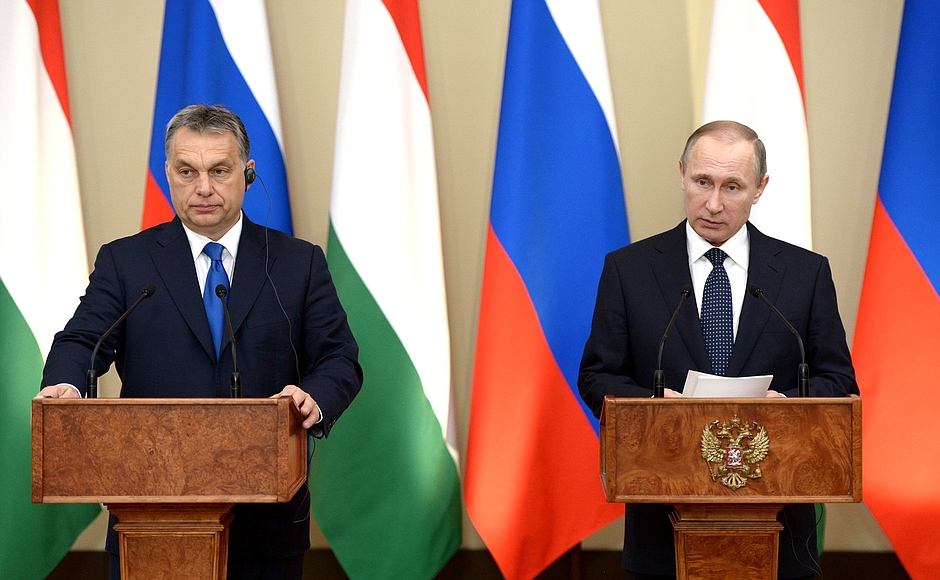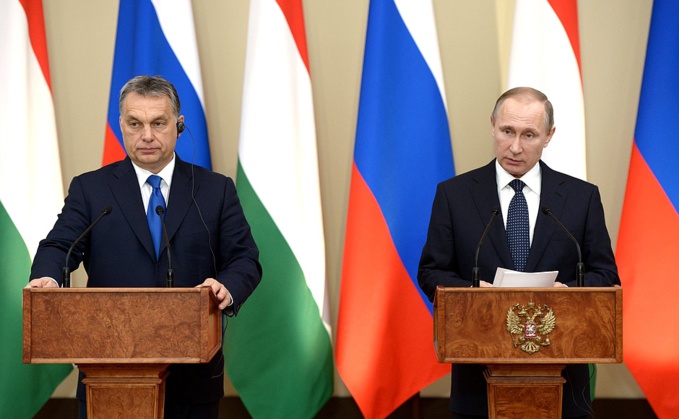First of all, the situation is critical on the border between Croatia and Slovenia. Slovenian parliament passed a law granting expanded rights to the military. Under the new law, soldiers are now also able to control the external borders of the Schengen area. The military forces are assisting police from already Monday. In addition, the government is plannig to increase the number of police officers.
With closing the borders at the end of last week, the Hungarian government helped to exacerbate the refugee crisis in Eastern Europe. Then it returned to its previous position and now considers it possible to give advice to the European Union. For example, the Hungarian Foreign Minister Peter Szijjarto said he sees no possibility of Russia's participation to resolve any refugee crisis or the conflict in Syria:
- We must finally recognize and understand that without pragmatic cooperation with Russia, there can be no solution for the refugees crisis. Without Transatlantic - Russian agreement, there is no solution of the Syrian conflict, and accordingly, there is no solution of the refugee crisis faced by the Europe. Also, Szijjarto acclaimed the meeting in Vienna with the participation of foreign ministers of the USA, Russia, Turkey and Saudi Arabia, scheduled for Friday.
Since last Saturday, more than 20 thousand refugees arrived in Slovenia. Most of them are going to reach Austria and Germany. At least 6000 people spent the Wednesday night in temporary shelters. Because of the closure of the Hungarian border, Slovenia, with its two million inhabitants, has become a new eye of the needle on the road of refugees, heading to the North.
European Commission President Jean-Claude Juncker, speaking in Brussels, said that he continuing state of emergency along the Balkan route demands closer cooperation, more intensive consultations and immediately implemented steps. The purpose of the Sunday meeting is to adopt decisions, which "should be implemented quickly."
Last week's summit with the participation of all 28 EU member states, did not give tangible results. First of all, the Eastern European countries refuse to host refugees in accordance with the quota system.
In Berlin, government spokesman Steffen Seibert stated the need to better coordinate the actions of the states concerned. In addition, the government circles are concerned about the fact that "there are political ditches in the Balkans, reappearing between the states of the former Yugoslavia, which worked so hard to fill them." The European Union, as stated in government circles, it should use the Balkan route to show classicize joint actions, instead of demonstrating reflexes of national states. "
Faced with the endless stream of refugees heading to Germany, the federal government insists that those persons, who have been denied asylum, must faster and more consistently be expelled from the country. At a cabinet meeting, according to some participants, the head of the Federal Chancellery Peter Altmaier and Interior Minister Thomas de Maiziere presented a number of proposals.
This is about a review of the rules dealing with those people who have been denied asylum. Also, from now on these people will not be informed of their deportation order, so that they would be unable to escape. The federal government is studying the possibility to use the Bundeswehr aircrafts for the expulsion. However, civilian airliners will be used more often - said government spokesman Steffen Seibert.
Federal Chancellor Angela Merkel said that Germany should learn to deal with the flow of refugees at the congress of IG Metall in Frankfurt. It is important to show to the arriving people, who find themselves in a difficult situation, that the article number 1 of the Basic Law - "Human dignity is inviolable" - actually works. However, according to her, Europe must establish a fair distribution of the burden. Economic refugees, for example, from the Balkan states, cannot remain in Germany. "Otherwise we will not be able to provide protection to those in need of it", - said Merkel.
The scaling crisis requires more attention to be given to the civil war in Syria, where the refugees are coming from, and where the intensity of fighting has increased. Turkish President Recep Tayyip Erdogan, according to Reuters, expressed his concern over the developments in Syria in a telephone conversation with Russian President Vladimir Putin.
The bombing in the north of the Syrian city of Aleppo, with participation of the Russian Air Force, will increase the number of refugees, the president said. According to the presidential administration, he said this in his conversation on Wednesday. Turkey already hosts several million Syrian refugees, many of whom then are sent to Germany. Russia and Turkey are pursuing different goals in Syria. While the leadership in Moscow tries to use air strikes to change the situation in the civil war in favor of the President Bashar al-Assad, Turkey, as well as the West, insists on the resignation of the Syrian president. Meanwhile, the government in Ankara acknowledges that Assad may remain in power for a transitional period after the war. This attitude is spreading among Western governments.
Original by Die Welt
With closing the borders at the end of last week, the Hungarian government helped to exacerbate the refugee crisis in Eastern Europe. Then it returned to its previous position and now considers it possible to give advice to the European Union. For example, the Hungarian Foreign Minister Peter Szijjarto said he sees no possibility of Russia's participation to resolve any refugee crisis or the conflict in Syria:
- We must finally recognize and understand that without pragmatic cooperation with Russia, there can be no solution for the refugees crisis. Without Transatlantic - Russian agreement, there is no solution of the Syrian conflict, and accordingly, there is no solution of the refugee crisis faced by the Europe. Also, Szijjarto acclaimed the meeting in Vienna with the participation of foreign ministers of the USA, Russia, Turkey and Saudi Arabia, scheduled for Friday.
Since last Saturday, more than 20 thousand refugees arrived in Slovenia. Most of them are going to reach Austria and Germany. At least 6000 people spent the Wednesday night in temporary shelters. Because of the closure of the Hungarian border, Slovenia, with its two million inhabitants, has become a new eye of the needle on the road of refugees, heading to the North.
European Commission President Jean-Claude Juncker, speaking in Brussels, said that he continuing state of emergency along the Balkan route demands closer cooperation, more intensive consultations and immediately implemented steps. The purpose of the Sunday meeting is to adopt decisions, which "should be implemented quickly."
Last week's summit with the participation of all 28 EU member states, did not give tangible results. First of all, the Eastern European countries refuse to host refugees in accordance with the quota system.
In Berlin, government spokesman Steffen Seibert stated the need to better coordinate the actions of the states concerned. In addition, the government circles are concerned about the fact that "there are political ditches in the Balkans, reappearing between the states of the former Yugoslavia, which worked so hard to fill them." The European Union, as stated in government circles, it should use the Balkan route to show classicize joint actions, instead of demonstrating reflexes of national states. "
Faced with the endless stream of refugees heading to Germany, the federal government insists that those persons, who have been denied asylum, must faster and more consistently be expelled from the country. At a cabinet meeting, according to some participants, the head of the Federal Chancellery Peter Altmaier and Interior Minister Thomas de Maiziere presented a number of proposals.
This is about a review of the rules dealing with those people who have been denied asylum. Also, from now on these people will not be informed of their deportation order, so that they would be unable to escape. The federal government is studying the possibility to use the Bundeswehr aircrafts for the expulsion. However, civilian airliners will be used more often - said government spokesman Steffen Seibert.
Federal Chancellor Angela Merkel said that Germany should learn to deal with the flow of refugees at the congress of IG Metall in Frankfurt. It is important to show to the arriving people, who find themselves in a difficult situation, that the article number 1 of the Basic Law - "Human dignity is inviolable" - actually works. However, according to her, Europe must establish a fair distribution of the burden. Economic refugees, for example, from the Balkan states, cannot remain in Germany. "Otherwise we will not be able to provide protection to those in need of it", - said Merkel.
The scaling crisis requires more attention to be given to the civil war in Syria, where the refugees are coming from, and where the intensity of fighting has increased. Turkish President Recep Tayyip Erdogan, according to Reuters, expressed his concern over the developments in Syria in a telephone conversation with Russian President Vladimir Putin.
The bombing in the north of the Syrian city of Aleppo, with participation of the Russian Air Force, will increase the number of refugees, the president said. According to the presidential administration, he said this in his conversation on Wednesday. Turkey already hosts several million Syrian refugees, many of whom then are sent to Germany. Russia and Turkey are pursuing different goals in Syria. While the leadership in Moscow tries to use air strikes to change the situation in the civil war in favor of the President Bashar al-Assad, Turkey, as well as the West, insists on the resignation of the Syrian president. Meanwhile, the government in Ankara acknowledges that Assad may remain in power for a transitional period after the war. This attitude is spreading among Western governments.
Original by Die Welt



















